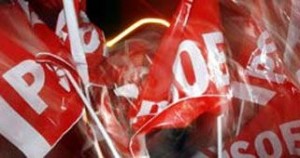
The legislature is limping to a close. Since José Luis Rodríguez Zapatero’s conversion to market orthodoxy in the spring of 2010, the prime minister has made no secret of the fact that his sole obsession is to sail the Spanish ship clear of the turbulent waters of a bailout, and he seems set to succeed. But his government’s final manoeuvres have unfortunately had the effect of scuttling the lifeboat of Socialism driven by the party’s chosen candidate for the November 20 elections. Alfredo Pérez Rubalcaba is an able seaman, but he is navigating into an electoral storm made even worse by the last acts of his former Cabinet colleagues.
First came the tawdry deal with the Popular Party (PP) to reform the Constitution in a question of days, banishing the idea of budget deficits as all the other parties and the indignados protestors snarled their disapproval of such roughshod neoliberalism. It was worth perhaps a few days of respite from the markets’ ravages, but Spain’s risk premium remains sky-high as the flares go up from Athens and Rome and the Paris-Berlin euro-zone axis dithers over whether the dangers of a fresh rescue operation are too great to be countenanced.
Then followed the comic opera of the revamped wealth tax, something Rubalcaba had taken it upon himself to champion as a token of his intention to retain his left-of-centre values in the coming election campaign. The PP smelt blood: the Zapatero government was drifting towards a reversal of one of its raft of frivolous decisions in the heady days of crisis denial in 2008, when it told regions to stop collecting tax on large fortunes for which they would be compensated in exact terms. In response, PP administrations up and down the country declared a mutiny; they would not collect any new levy.
On state television, candidate Rubalcaba told the rebels they would no longer sup from the compensation fund, and thus be even further out of pocket amid a scene of abject scarcity in regional financing. Sitting alongside him on the TVE screen was Economy Minister Elena Salgado, the guardian of fiscal rectitude, who said nothing…until the day before Cabinet approved a return of a revised wealth tax, when she pointed out that that compensation fund could not be withheld, and that regions who did apply the new levy would actually be even better off than before.
Cuts and taxes, anyone?
But if the would-be hero of the post-Zapatero Socialist narrative has been tangled up in an unintended pantomime scene, there is still the great entrance of a booming-voiced villain to come. His chorus is already pumping it out, as the PP’s Esperanza Aguirre and Dolores de Cospedal merrily slash their way into public spending in Madrid and Castilla-La Mancha. But PP leader Mariano Rajoy has yet to consent to rasping out a single bar of policy music, barring last week’s vague mention of a commitment to trim corporation tax in certain circumstances. He has said only that he will not raise any taxes “at first”, and he won’t clarify whether he will attempt to unbundle the wealth tax fiasco.
Then again, why should he get out his megaphone? This is the man who has lost two elections: one three days after the March 11 bombings of 2004, when Aznar’s government was panicked into lying about the perpetrators, fearful of a nasty Iraq war bounce; and then again, three years ago, when he said the government was not telling the truth about the bubble that was the Spanish economy, and so it transpired a question of weeks later.
Rajoy knows the electoral ship he is sailing has a reliable motor, and that is an unemployment rate of over 20 percent. Rubalcaba may be the best prime minister Spain will never have, but all he has now are fine and honest-sounding words, which are being drowned out by a howling gale and the crashing break-up of a second Socialist term that has gutted the party.
Leave a Reply
You must be logged in to post a comment.